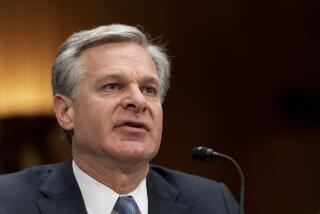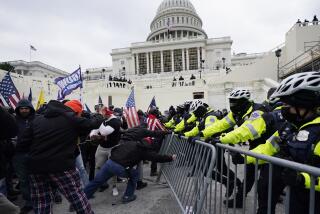Many fear FBI’s anthrax case is cold
WASHINGTON — Five years after a series of deadly anthrax-laced letters rattled the nation, the FBI has offered no indication that it is any closer to solving the first major act of bioterrorism on U.S. soil, leading critics to speculate the probe has stalled and to question how well federal officials would handle future attacks.
Members of Congress and targets of the attacks -- which killed five people between Oct. 5 and Nov. 21, 2001, sickened 17 and exposed thousands of others -- increasingly are expressing concern that the FBI-led federal investigation, code-named Amerithrax, has been mismanaged.
FBI officials have stopped providing regular briefings to victims and lawmakers about the investigation. The federal task force leading the investigation has shrunk in half. And it is now on its third leader.
The credentials of the latest chief may be telling: He has worked on complex international criminal cases that have run cold.
The reticence of the FBI is in sharp contrast to bold predictions the agency made about the investigation in its early days.
“Their public pronouncements about their confidence levels were obviously way off the mark all the way along,” said Tom Daschle, the former Democratic senator from South Dakota whose Capitol Hill office was one of the targets of the attacks. “It has sort of been the domestic version of Iraq. They made a lot of assumptions that turned out not to be accurate.”
Daschle, now a senior fellow at the Center for American Progress, said he asked the FBI about a month ago for an update but was rebuffed.
“Clearly, this whole investigation has gone very cold,” he said. “Because it has become so cold, they are all the more apprehensive about acknowledging that they do not have any real good evidence or leads.”
A leading Republican, Sen. Charles E. Grassley of Iowa, also complained about the lack of new information on the investigation in a letter last month to Atty. Gen. Alberto R. Gonzales. Grassley is threatening to subpoena FBI officials to testify before Congress or to hold up Justice Department nominations if the agency does not divulge more information soon.
The FBI says its investigation remains highly active. It has told lawmakers that it would not provide any more briefings on the case in part out of fear that sensitive information would be leaked to the media.
“We have a substantial number of agents continuing to work on that case, and my expectation is that it will be solved and that the person or persons responsible will be brought to justice,” FBI Director Robert S. Mueller III said in an interview in September. “Some cases take longer than others.”
The unsolved mystery comes amid growing concern about federal efforts to detect and prevent even more catastrophic bioterrorist attacks. The government has set aside an estimated $18 billion for bio-defense research over the last five years, although it is far from clear what the nation has gotten for its money.
This week, citing the five-year anniversary of the anthrax attacks, a bipartisan group of senators asked the Government Accountability Office to conduct a wide-ranging assessment of the bio-defense program.
Huge investigation
The anthrax attacks triggered one of the costliest federal manhunts ever -- starting a week after the Sept. 11 attacks, when letters containing anthrax began coursing through the mail, targeting members of the media and the Capitol Hill offices of Daschle and Sen. Patrick J. Leahy (D-Vt.).
The FBI said it had conducted 9,100 interviews and obtained 6,000 subpoenas. It has hired psychologists, handwriting analysts and forensic analysts. It has spent millions on scientific studies to determine such information as the strain of the bacteria and the water used to prepare the lethal spores. And it has tracked a spate of anthrax “hoax” letters; one such letter was received last week by The Times.
Much of the initial public focus was on a medical doctor and virologist, Stephen J. Hatfill, who had worked for two years at an Army lab in Maryland, where the strain of anthrax used in the attacks was once studied.
FBI agents searched his home, took samples of his blood and put him on 24-hour surveillance. Then-Atty. Gen. John Ashcroft publicly declared him a “person of interest.”
But Hatfill was never charged and says he is not responsible for the letters. Now he’s fighting the Justice Department and FBI in a lawsuit claiming that they destroyed his reputation.
His lawyers have taken the sworn testimony of more than 30 journalists and investigators in an attempt to prove the FBI illegally leaked damaging information about him. Hatfill declined comment through his lawyer.
The public fingering of Hatfill was the first of many missteps that experts said had afflicted the probe.
“In how many investigations does the attorney general personally go out there and start talking about persons of interest? It should never happen,” said Stephen Freccero, a former federal prosecutor. “That was a huge mistake. It was appalling. All the basic rules of a covert investigation were violated.”
Freccero, who prosecuted Unabomber Theodore Kaczynski, said that centering the anthrax probe in Washington politicized the case, making it difficult for investigators to independently pursue leads.
The case also has been slowed by the bureau’s changing understanding of the quality of the anthrax used. Investigators originally believed the powder was highly refined and could only have been produced by experts with state-of-the-art technology. But the FBI eventually abandoned that idea.
In the recent interview, Mueller said, “From the outset, we have been open to any and all theories, and the investigation continues on any and all theories.” But some observers said that the incorrect assumptions about the anthrax may have led the FBI to adopt an unduly narrow focus on potential suspects. According to one former federal law enforcement official, no other clear suspects have emerged in recent years.
“The way they were thinking was that it had to be a scientist at one of these ... laboratories,” said the former official, who spoke on the condition of anonymity because he still works for the federal government and the investigation is ongoing. “Now, all of a sudden, you have people who may be hobbyists or ... chemists who think they can do this stuff and might have done this stuff.”
Some also have criticized the agency for not being more receptive to outside advice. Dr. Ken Alibek, a bio-weapons pioneer from the former Soviet Union, said he had written to Mueller to volunteer. “I said, ‘Please keep in mind, I have expertise and I would like to help you resolve this case,’ ” he said. Alibek said he got a “thanks, but no thanks” letter from a top aide to Mueller. The bureau, he was told, already had “a big group of people working on this issue.”
Leadership change
The new leader of that group, Edward Montooth, is the third to oversee the investigation. He declined to comment through an FBI spokesman.
People who have worked with Montooth said he had specialized in cases where Americans were killed overseas, trying to solve crimes in such places as Rwanda and Indonesia. He was on an FBI team that searched for mass graves in Kosovo and also helped investigate war crimes in the Balkans.
“Those cases get cold fast,” said a law enforcement official who knows Montooth. “A lot of terror cases overseas can be 10 to 15 years before the case develops to the point where we can get the defendants.”
Montooth replaced Richard Lambert, who headed the investigation from August 2002 through September 2006. Lambert said he decided to leave and called it a natural career progression. He now heads the FBI office in Knoxville, Tenn.
Lambert said he was “very confident” the case would be solved.
As the probe enters its sixth year, the FBI is urging patience, and notes that complex investigations often take years to resolve. It has compared the case to the Unabomber investigation, which took 17 years to solve, until the assailant renewed his campaign of terror and a relative turned him in.
On the anthrax section of its website, the FBI promises that its agents “continue to pursue each and every lead aggressively.”
josh.meyer@latimes.com
More to Read
Sign up for Essential California
The most important California stories and recommendations in your inbox every morning.
You may occasionally receive promotional content from the Los Angeles Times.










